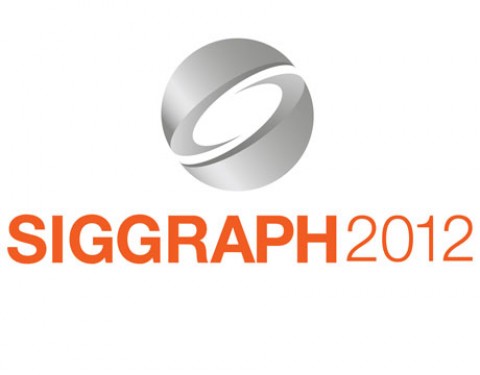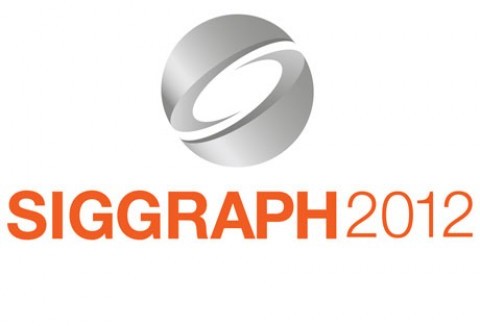

SIGGRAPH Announces 2012 Production Sessions

Chicago, IL — SIGGRAPH 2012, August 5-9 at the Los Angeles Convention Center, just released an all-star line-up of production sessions that will be featured as part of its annual Computer Animation Festival, which is open to the public.
“Nowhere else in the world can you get this level of access to elite and talented Hollywood computer graphic experts and creative talent,” said Jerome Solomon, SIGGRAPH 2012 Production Sessions Chair from The Art Institute of California – Sunnyvale. “Having such cooperation from so many major studios could only happen at SIGGRAPH and we are ecstatic to be able to bring our community such incredible content.”
The Computer Animation Festival, chaired this year by Joshua Grow from the Creative-Cartel, is recognized by the Academy of Motion Picture Arts and Sciences as a qualifying festival. Since 1999, several works originally presented in the Computer Animation Festival have been nominated for or have received a “Best Animated Short” Academy Award. This year’s selections will be featured during the Computer Animation Festival through a series of daily Festival Screenings and the iconic Electronic Theater, allowing attendees to get a glimpse behind the making of computer generated effects, visualizations, and animations
Following are the details of the 2012 Production Sessions:
Pixomondo Presents Hugo: A Cinematic Convergence of 3D and Visual Effects
Panelists: Ben Grossman, Visual Effects Supervisor, Alex Henning, Digital Effects Supervisor, Adam Watkins, CG Supervisor from Pixomondo, and Matthew Gratzner, Visual Effects Supervisor from New Deal Studios
In Hugo, Martin Scorsese’s love letter to classic cinema and cinema history, the director was passionate about pushing the capabilities of stereoscopic filmmaking to new heights. Pixomondo developed custom workflows to handle complex challenges in VFX and capture all of the live-action production data required to accommodate the rigorous effects and post-production demands of the project. This Pixomondo panel discusses the creative and technical challenges they overcame to achieve Scorsese’s vision for early filmmaking in stereo 3D. Also joining them will be New Deal Studios visual effects supervisor, Matthew Gratzner, who was responsible for creating the train crash sequence in the film.
Building Disney/Pixar’s Brave: Pencils to Pixels
Panelists: Colin Thompson, Character Shading Supervisor, Tia Kratter, Shading Art Director
Claudia Chung, Simulation Supervisor, and Danielle Feinberg, Director of Photography, Lighting
From bouncing red curls to gusty dark forests, this panel summarizes how Disney•Pixar created their summer 2012 film: Brave. The artists lead a guided tour through Brave‘s production pipeline, illustrating the kind of exploration and problem-solving required to move an asset from initial design through characters and sets, animation, and lighting, and into a final rendered frame.
Sony Pictures Animation: Checking in at Hotel Transylvania
Welcome to Hotel Transylvania, Dracula’s lavish five-stake resort, where monsters and their families can live it up, free to be the monsters they are without human interference. For one special weekend, Dracula invites some of his best friends — Frankenstein and his bride, the Mummy, the Invisible Man, the Werewolf family, and more — to celebrate his beloved daughter Mavis’s 118th birthday. In this session, first-time feature director Genndy Tartakovsky (Dexter’s Laboratory, Samurai Jack, Clone Wars) and the creative team behind Hotel Transylvania explore the art, unique animation style, and technical achievements of Sony Pictures Animation’s new animated feature.
Digital Domain Presents Making the Steel Real: Moving VFX Into Production
Moderator: Michael Fink, Academy-Award-Winning Visual Effects Supervisor
Panelists: Ron Ames, Associate Producer, Erik Nash, Digital Domain, John Rosengrant, Legacy Effects, Swen Gillberg, Digital Domain and Dan Taylor, Animation Supervisor
Nominated for a visual effects Academy Award, DreamWorks’ Real Steel was recognized not only for its rollicking boxing matches between CG robots, but also for the seamless way the film moves between practical robots and their CG counterparts. In this panel, some of the Real Steel filmmakers walk through robot design, explain key techniques and shots, and share the groundbreaking virtual-production process that they packed up and moved to Detroit, which compressed the shooting schedule to 71 days with no second unit.
Sony Pictures Imageworks: Travel Behind the Scenes of Men in Black 3
Sony Pictures Imageworks’ visual effects for Men in Black 3 included diverse and richly detailed characters and environments, all created with a heightened sense of realism. With a mix of humor and style, the Men in Black return to 1969 with a digital re-creation of New York’s Shea Stadium and the Apollo 11 rocket launch, and an action-packed monocycle chase through the streets of Brooklyn. This panel explores the challenges and achievements of producing the visual effects for Men in Black 3.
Sony Pictures Imageworks: The Untold Story of The Amazing Spider-Man
Sony Pictures Imageworks oversaw the visual effects for the untold story of Spider-Man, set in a gritty, edgy urban world. The VFX team established a visual style that naturally blends cutting-edge live-action stunt work, extensive digital environments, and CG character animation. This panel provides a revealing inside look at VFX production for an “amazing” film.
Rhythm & Hues Studios: 25 Years of Art, Technology and People
In this panel and presentation, an array of artists and executives associated with the past and present of Rhythm & Hues Studios explore the many factors that have led to the studio’s longevity and success. Highlights include a retrospective of the company’s early days, from its origins at the pioneering CGI company Robert Abel and Associates in the 1970s and 80s and the founding of Rhythm & Hues in 1987, to its groundbreaking animation work in the ‘90s and its recent work The Chronicles of Narnia: The Lion, the Witch and the Wardrobe, VFX Oscar winner The Golden Compass, The Incredible Hulk, the Alvin and The Chipmunks franchise, and more.
Industrial Light & Magic Presents: The Visual Effects of Battleship
Panelists: Grady Cofer Visual Effects Supervisor, Doug Smythe, Digital Production Supervisor, Glen McIntosh, Animation Supervisor, Willi Geiger, CG Supervisor from Industrial Light & Magic
A behind-the-scenes look at Peter Berg’s blockbuster sci-fi epic Battleship. The ILM production team reviews the film’s various challenges and describes why it was necessary to revamp the studio’s award-winning fluid-simulation system. Also, advances in CG destruction and simulation technology required to accurately depict everything from a resurrected World War II battleship to a fleet of modern-day naval ships, not to mention aliens and their formidable fleet of spacecraft.
Balancing Act: Life as a Visual Effects Supervisor at DreamWorks Animation
Panelists: Ken Bielenberg, Puss in Boots, Mahesh Ramasubramanian, Madagascar 3: Europe’s Most Wanted, David Prescott, Rise of the Guardians (November 2012) and Markus Manninen The Croods (March 2013) from DreamWorks Animation
In this panel, the Visual Effects Supervisors for the last two and next two DreamWorks Animation films discuss how they approached each production. In the studio environment, there are opportunities to share development with other shows, but differing visual requirements also mean each show has unique needs. How do the visual-effects teams balance the safety of using tried-and true-techniques with the requirements to create ever more visually sophisticated and complex work? How do they manage the benefits of sharing across shows with the specific needs of their show? Each panelist shares some successes (and failures!) from their most recent projects.
Weta Digital Presents Virtual Production: Combining Animation, Visual Effects, and Live-Action Filmmaking
Four-time Oscar-winning Senior Visual Effects Supervisor, Joe Letteri, presents Weta Digital’s pioneering virtual-production work on The Adventures of Tintin and “Avatar”. His talk also addresses workflow development at Weta going all the way back to The Lord of the Rings and suggests some areas of future development. Weta sees virtual production as a connected, holistic approach to filmmaking that melds the best of animation and live-action techniques in pre-production, onset, and post. This presentation demonstrates how virtual production brings all of the components of filmmaking together to provide a way of working that has attracted directors like Peter Jackson, James Cameron, and Steven Spielberg.
The Art and Science Behind Walt Disney Animation Studios’ Paperman
Moderator: Darrin Butters, Animator
Panelists: John Kahrs, Director, Patrick Osborne, Animation Supervisor, Amol Sathe, Lighting and Compositing Supervisor, Jeff Turley, Art Director, and Brian Whited, Final Line Software
Applying a technique that seamlessly merges computer-generated and hand-drawn animation techniques, first-time director, John Kahrs takes the art of animation in a bold new direction with Paperman. Using a minimalist black-and-white style, the short film follows the story of a lonely young man in mid-century New York City, whose destiny takes an unexpected turn after a chance meeting with a beautiful woman on his morning commute. In this panel, members of the small, innovative group at Walt Disney Animation Studios that created Paperman share their insights about the art, design, and technology of this innovative project.
High Frame Rate Cinema, Impacts on Art and Technology With Douglas Trumbull and Dennis Muren
Panelists: Paul Salvini, Christie Digital Systems USA, Inc.; Douglas Trumbull, Filmmaker; Dennis Muren Industrial Light & Magic; Phil Oatley, Park Road Post Production; Lincoln Wallen, DreamWorks Animation; Jim Beshears, DreamWorks Animation SKG; Darin Grant, Digital Domain; Matthew Cowan, RealD Inc.; Luke Moore Side Effects Software Inc.; John Helliker, Screen Industries Research and Training Centre
Some of the biggest movies on the horizon — Avatar’s sequels and Lord of the Rings prequels — will be presented in stereoscopic 3D high-frame-rate cinema. Peter Jackson and James Cameron are betting on their expectation that audiences will love the more immersive and detailed worlds that these 3D productions can offer. But what IS high-frame-rate cinema, and what will it mean to producers of content and to the audience experience? This panel of experts explains high-frame-rate cinema and discusses the implications of producing and experiencing cinematic content in the new medium.
LAIKA’s ParaNorman: The Fusion of Stop Motion and CGÂ in a Zombie-Ridden World
Panelists: Brian Van’t Hul, VFX Supervisor, Steve Emerson, Compositing Supervisor, and Andrew Nawrot, CG and Look Development Supervisor
Get a first-hand, 3D look at LAIKA’s interdependent combination of stop-motion and CG in an environment where hand-crafted movement is seamlessly integrated with computer technology, from initial concept to final frame. Academy Award-winner Brian Van’t Hul is joined by Steve Emerson and Andrew Nawrot to discuss the collaborative relationship of the technologies in the upcoming feature ParaNorman (in theaters August 17).
Assembling the VFX for Marvel’s The Avengers
Panelists: Victoria Alonso, Executive Producer and Executive Vice President of Visual Effects & Post Production; Jeff White, Visual Effects Supervisor, ILM; Guy Williams, Visual Effects Supervisor, Weta Digital; Marc Chu, Animation Supervisor, ILM; Aaron Gilman Animation Supervisor, Weta Digital
Leaders of the visual effects teams from Industrial Light & Magic and Weta Digital will discuss the unique effects challenges that this blockbuster film presented and how the studios broke new ground with their respective approaches to creating the seamless effects work. From the epic Mountain Battle between Iron Man and Thor and the climatic alien invasion of Manhattan to bringing the Hulk to life, the supervisors will detail what worked, what didn’t and the complexities involved in bringing The Avengers to the big screen.
